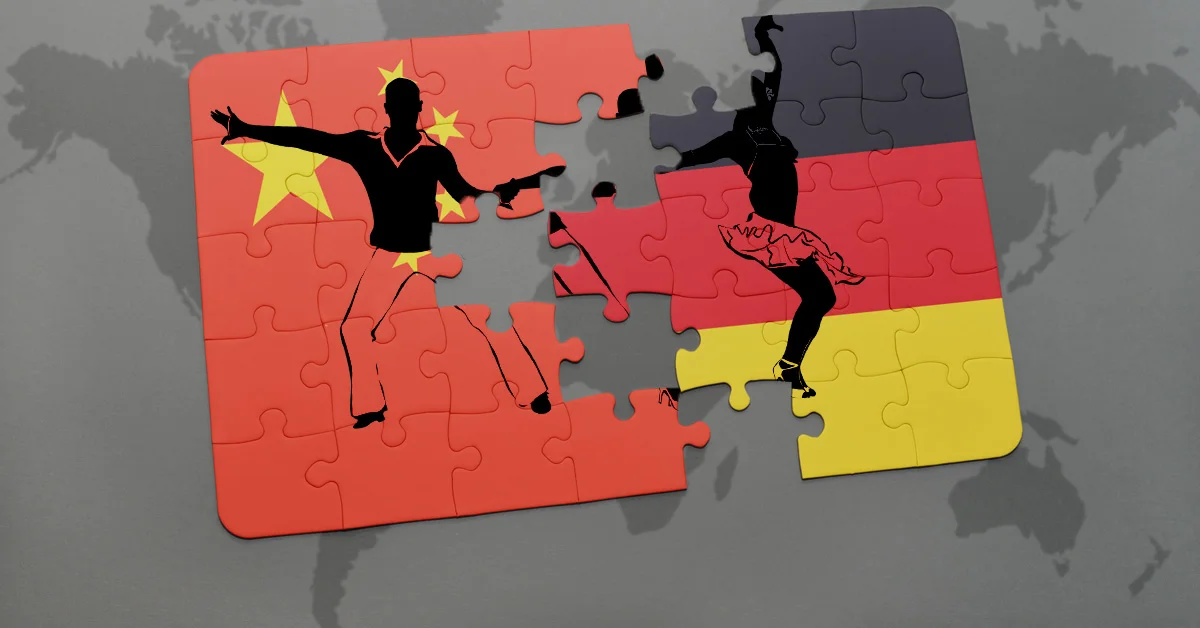
Distinguished professor at the UCLA Anderson School of Management, Christopher Tang, looks into Germany’s delicate balancing act with China.
Amid the trade war and technology war between the United States and China, the German government used the term “de-risking” to describe its strategy on China in a 64-page report on July 13. After establishing a solid trade relationship between China and Germany, the Chinese Government finds the term de-risking counter-productive at best and offensive at worst.
Instead of de-risking, calling it a diversifying strategy would be more diplomatic and no less accurate. What is the difference between de-risking and diversifying?
A de-risking strategy anchors on risk reduction to reduce the likelihood and severity of conflict with China. A diversifying strategy can also mitigate risk, but it captures the spirit of balancing risk and opportunity. Even though both terms are synonymous, the latter is easier for China to accept because, after all, China wants to be seen as an economic opportunity for Germany, not a risk.
The Strategy on China report reveals Germany’s desire to engage China by combining competition and cooperation. On one side, Germany needs to sustain its trade with China. Conversely, Germany must become less dependent on China to ensure supply chain resilience. This perspective is understandable, but calling it a “de-risking” strategy is offensive. Indeed, Chinese Foreign Ministry spokesman Wang Wenbin responded to the report by stating that “viewing China as the source of risk is a fatal miscalculation.”
Wang’s comment is understandable when the trade relationship between Germany and China has been strong for decades. For example, Volkswagen was one of the first automakers to establish major manufacturing facilities in China, starting in 1978. Since then, China has become its most important market, accounting for 50% of VW’s worldwide sales in 2021. Indeed, China has been Germany’s biggest trade partner for the past seven years, with bilateral trade rising to a record high of €298bn (£256.3bn) in 2022.
Strained alliances
When the economies of China and Germany have been intertwined for decades, Germany’s depiction of de-risking is baffling and inconsistent, especially after it sent strong signals to China about its desire to strengthen its trade relationship even further.
First, German Chancellor Olaf Scholz visited China to assure President Xi Jinping in November that “business with the world’s second-largest economy must continue”. Also, Scholz’s trip was accompanied by a delegation of 12 German industry titans, including the CEOs of Volkswagen, Deutsche Bank, Siemens and chemicals giant BASF, with a view to expanding the two countries’ economic cooperation. They have since generated new market opportunities for both countries. In April 2023, Volkswagen announced its commitment to invest over €1bn (£860.2m) to develop an electric car and business centre in Hefei, the capital city of China’s Anhui Province. At the same time, China’s BYD began selling its electric vehicles Atto-3 and other models in Germany in February 2023, and it is considering opening an assembly plant in Germany.
Second, in May 2023, the German Government approved China’s COSCO 24.99% ownership of a container terminal at Hamburg port. This approval was a compromise for the coalition partners of Scholz’s Social Democrats to quell intense opposition from the Greens and the Free Democrats. However, this approval can improve operational efficiency as close to one-third of the goods handled at Hamburg port are from or destined for China.
Caught in the crossfire
Given this positive economic development in early 2023, it came as a surprise to China when Germany defined it as “a partner, competitor and systemic rival” in its report. The report calls for reducing dependency on China in critical sectors, such as medicine, batteries and chips, which appears to resemble the strategy adopted by the United States. This abrupt change of narrative is probably triggered by three risk factors.
First is the political risk. Germany is pressured by other EU countries and the US to adopt a more critical and confrontational approach towards China. In other words, to view China as a threat and not an opportunity.
Second is the supply risk. Some economists have warned that Germany’s supply dependency on China has exceeded that of the US and France, especially in raw materials and intermediary products. For example, China owns 80% of the solar panels and 60% of the EV battery market worldwide. Also, China accounts for 98% of the global production of gallium and 68% of the refinery production of germanium, which is critical to producing advanced chips. China’s July announcement to restrict the export of gallium and germanium stoked new supply fear.
Third is the climate risk. Germany was late in EV development to fight climate change. By 2023, Germany’s EV market was behind China and the US. As a nation that takes pride in its automotive sector and environmental sustainability, the idea that Germany would rely on China’s solar panels and EV batteries to fight climate change did not sit well with the public in Germany.
Supply chain reshuffle
To strike a balance between risks and opportunities, diversifying Germany’s supply base by cultivating alternative suppliers makes sense. For example, in 2022, BMW announced its plan to build EVs in South Carolina and source EV battery cells in the US. Also, Siemens announced in July that it plans to invest €1bn (£860.2m) in new factories making electronic components and machine tool controls.
Instead of calling it de-risking, diversifying the supply base is a more realistic and diplomatic term that should be more acceptable to China. This is because many Chinese firms have also diversified their supply base from China to Vietnam to ensure supply chain resilience during the Covid pandemic and to reduce labour costs.
When engaging with China, do as the Chinese do. Some supply chain diplomatic juggling can help Germany to strike a more agreeable balance between cooperation and competition.
Christopher Tang is a thought leader in global supply chain management with over 30 years of experience in different sectors across Europe, Asia, and the Americas.
Related and recommended

Neil Mullarkey is an improvisational comedian who has a few tricks to teach the world of business

Hubert Viriot explains his approach to using technology in the hospitality industry

The advertising veteran believes that leaders need to listen to those around them to set the right course for the business
Burnout is a serious problem for many leaders, but if you can spot the signs, you can stop it – and recover

